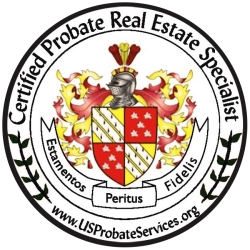Get the Right Professional Assistance
Probate and trust administration can be complicated on many levels. Most people think about retaining only an attorney for their probate or trust matter. While this is a good idea to start with, it’s not the end of the road. You will likely need the assistance of many different professionals to help you with a probate or trust administration so that a house may be properly sold. These include:
Probate and trust attorney: We can’t emphasize enough how important it is to retain competent legal counsel to guide you through the probate or trust administration process. A qualified attorney can review your situation and offer guidance on how to open an estate, which type of administration is needed, and whether a probate is even needed. (Sometimes it’s not.) Having a good probate attorney makes all of the other tasks involved with administering a decedent’s estate easier because probate requires the probate court’s authorization to conduct certain activities and to undertake certain actions on behalf of the estate. Not having the proper court authorization can bring everything to a screeching halt at the worst possible moment. Proper legal representation can help you determine the best way to deal with estate creditors, how to file for (or defend against) an elective share claim or a family allowance request, as well as how to properly work with the estate or trust beneficiaries.
Real Estate Broker: Assuming your probate estate or trust has real estate in it, and you will be selling the real estate, you need a qualified and licensed real estate broker who is well versed in selling probate or trust property. Certain real estate brokers specialize in these types of transactions and have taken classes to be designated as a “Certified Probate Real Estate Specialist” (CPRES). A CPRES broker will be able to seamlessly work with your other professionals to ensure the estate or trust property is sold in a timely manner with no hiccups. Not having a CPRES broker as your real estate broker can cause closing headaches and can also cause you to sell for less than the optimal price.
A CPRES broker will have this logo on his website or business card.
Accountant: Part of your duties as a personal representative or successor trustee involve filing and paying taxes of the decedent, and any taxes that may be incurred by the probate estate or trust subsequent to the decedent’s death. Probate estates are viewed as separate taxpaying entities apart from the decedent himself. Estates are required to obtain and use their own taxpayer identification number (the entity equivalent of a social security number). Probate estates are also required to file income tax returns (generally IRS Form 1041) to report any gross income above $600 they receive during administration. In addition to accounting and reporting income taxes, a qualified accountant can also help the estate maximize and document the step-up in basis that real estate receives upon the death of the owner. This is vital to ensuring that the estate pays the least amount possible in taxes after the real estate is sold.
Appraiser: C.R.S. §15-12-707 states: “The personal representative may employ qualified and disinterested appraisers to assist him in ascertaining the fair market value as of the date of the decedent’s death of any asset the value of which may be subject to reasonable doubt. Different people may be employed to appraise different kinds of assets included in the estate. The names and addresses of any appraiser shall be indicated on the inventory with the item or items he appraised.” If there are any disputed issues with the value of probate or trust real estate, it is highly advisable to obtain an appraisal of the property. An appraisal also can help the estate or trust maximize and document the step-up in basis for real estate received from a decedent (mentioned above).Accountants and appraisers can work together to get the best possible taxable outcome for the sale of a decedent’s property.
Expenses incurred for professional services provided to the estate or trust are paid by the estate or trust itself—not the personal representative or the trustee (See C.R.S. §15-12-805). These expenses are also generally deductible by the estate on the estate’s income tax return. Again, it is vital to obtain competent professional assistance to make the most of the probate or trust sale situation.
REMEMBER: Probate and trust settlement can be complicated and time-consuming. They can also be fraught with perils for the personal representative or successor trustee. Working with the appropriate professionals not only helps the personal representative or successor trustee streamline the process and get the most from any transaction, it can also protect the personal representative or successor trustee from liability to the beneficiaries or creditors.


